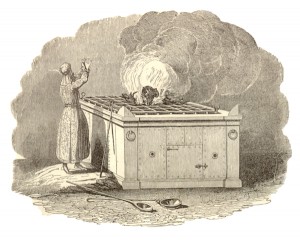 Imagine how it would affect your world view if you found yourself bound to an altar looking up at your father with a knife raised to kill you. Imagine yourself as a father being asked to do such a task. Of the two who do you think was the more profoundly affected by the events?
Imagine how it would affect your world view if you found yourself bound to an altar looking up at your father with a knife raised to kill you. Imagine yourself as a father being asked to do such a task. Of the two who do you think was the more profoundly affected by the events?
You know, we often point to the faith of Abraham in obedience to God, in this probably the most difficult test of his life, but what about the faith of Isaac? Have you ever thought that maybe Isaac’s faith in his father was also great? We often assume, at least I have, that Isaac was a helpless child bound against his will, but I wonder if that is really the whole story.
I wonder just how much Isaac trusted his own father’s word. You see, before Abraham and Isaac ascended the mountain, Abraham made it clear to his servants that he and Isaac would go and worship and return again. Abraham when asked by Isaac where the sacrifice would come from was assured by his father that YHWH would “provide himself a sacrifice”.
And Isaac spake unto Abraham his father, and said, My father: and he said, Here am I, my son. And he said, Behold the fire and the wood: but where is the lamb for a burnt offering? And Abraham said, My son, God will provide himself a lamb for a burnt offering: so they went both of them together. – (Genesis 22:7-8)
What do think Abraham said to Isaac as he raised that knife to the terrified look in his beloved son’s eyes? Through his own tears I wonder if Abraham didn’t remind Isaac of what a miracle his birth had been and that when he came into this world it was as a result of God’s promise to give Sarah and himself a son in their old age. Maybe he reassured him that he was their miracle child YHWH had promised and while he didn’t understand why he was being asked to sacrifice that precious gift or exactly how the next few minutes would play out, he trusted YHWH, the living God of the Bible, and he knew that at the end of the day both of them would be coming back down that mountain because they had a destiny to fulfill.
As Passover comes once again this year I can’t help but hear the echoes of that poignant story as I reflect on Yeshua’s death and resurrection on our behalf. While YHWH spared Abraham’s precious son he could not afford that luxury when His own son was bound to that ancient Roman wooden altar. Had he spared His own son, He would have damned all mankind for eternity and not one of us would have lived to fulfill our own destinies.
In retrospect we can look back down through the centuries and see that that test of Abraham’s faith was just a glimpse of YHWH’s redemptive plan for mankind. It was a milestone which marked a new phase in that plan which promised that through Abraham’s “seed” all nations of the world would be blessed.
And the angel of YHWH called unto Abraham out of heaven the second time, And said, By myself have I sworn [shaba], saith YHWH, for because thou hast done this thing, and hast not withheld thy son, thine only son: That in blessing I will bless thee, and in multiplying I will multiply thy seed as the stars of the heaven, and as the sand which is upon the sea shore; and thy seed shall possess the gate of his enemies;
And in thy seed shall all the nations of the earth be blessed; because thou hast obeyed my voice. (Genesis 22:15-18)
Did you know it was 40 Jubilees from the oath YHWH swore with Abraham until that oath was fulfilled in Yeshua, the Bible’s promised Messiah? I think we often forget that YHWH’s redemptive plan was given through Abraham’s seed and to really see the beauty and richness of that plan we need to always keep that context in mind.
Take the events of the Passover week during which Yeshua offered Himself as an atonement for mankind’s sins. Without understanding the history between YHWH’s oath with Abraham on that mountain so long ago and the terrible/wonderful events of Yeshua’s death and resurrection we have no context to truly understand and appreciate them.
Without Egypt there was no Passover and Exodus. Without the Exodus there was no law. Without the law there was no understanding of the hopelessness of sin. Without an understanding of sin, there could be no appreciation for the necessity of atonement for that sin.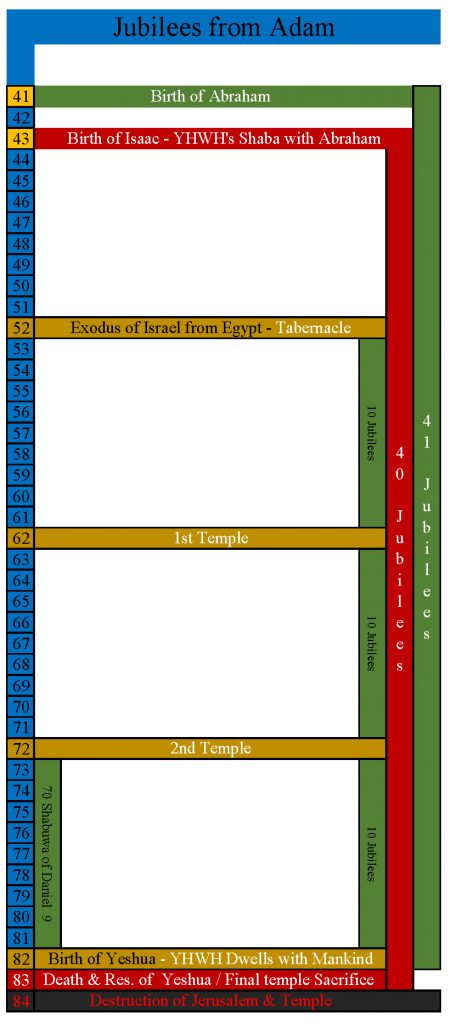
The amazing facts of the matter are that YHWH used Abraham’s seed known collectively as Israel to provide the world with a living witness to help illustrate His redemptive plan for mankind. That incredibly important role came with great blessings as well as responsibilities.
One of the responsibilities and blessings given to the children of Israel was the requirement to keep the Passover which they, as a people, have dutifully celebrated for over 3000 years.
Next week the Biblical calendar once again marks the celebration of Passover. So with this incredibly important Biblical holyday in mind, I’d like to share with you a bit of wonderful symbolism which is often overlooked in the celebration of this wonderful holyday. This symbolism helps illustrate the wonderful redemptive nature of this great Biblical celebration.
As many of you know Passover is part of the “law” YHWH gave to Israel through Moses. The author of the book of Hebrews described the law as but a “shadow of good things to come…” Hebrews goes on to show why Yeshua was a literal fulfilment of those shadow pictures found in the Torah.
We have to look no further for confirmation of this than Matthew 5:17, where Yeshua proclaimed,
“Think not that I am come to destroy the law, or the prophets: I am not come to destroy, but to fulfil.”
So let’s look into the law and see if we can see another way in which the Bible represents Yeshua as the “lamb of God which taketh away the sins of the world.”
The 14th Sacrifice
“Yet it pleased YHWH to bruise him; he hath put him to grief: when thou shalt make his soul an offering for sin, he shall see his seed, he shall prolong his days, and the pleasure of YHWH shall prosper in his hand. He shall see of the travail of his soul, and shall be satisfied: by his knowledge shall my righteous servant justify many; for he shall bear their iniquities.
Therefore will I divide him a portion with the great, and he shall divide the spoil with the strong; because he hath poured out his soul unto death: and he was numbered with the transgressors; and he bare the sin of many, and made intercession for the transgressors.
—Isaiah 53:10–12
Thought most didn’t understand it, the Bible predicted that the coming Messiah would offer himself as an sacrifice for sin. Even Yeshua disciples didn’t really understand until after his death and resurrection. Today many still don’t understand that the very essence of the Bible’s message is the story of Yeshua (Yeshua means Yahweh’s Salvation).
One of the places still overlook for that message is the sacrificial symbolism of the Bible. I’m continually thrilled by how congruently YHWH has woven this message into the Biblical record. To me, it’s the ultimate treasure hunt, with each new find bringing additional depth and beauty to our Creator’s plan of reconciliation for all mankind through Yeshua.
Purge out therefore the old leaven, that ye may be a new lump, as ye are unleavened. For even Christ our passover is sacrificed for us: therefore let us keep the feast, not with old leaven, neither with the leaven of malice and wickedness; but with the unleavened bread of sincerity and truth. (1 Corinthians 5:7–8)
It was therefore necessary that the patterns of things in the heavens should be purified with these; but the heavenly things themselves with better sacrifices than these . . . So Christ was once offered to bear the sins of many; and unto them that look for him shall he appear the second time without sin unto salvation. (Hebrews 9:23–28)
For the law having a shadow of good things to come, and not the very image of the things, can never with those sacrifices which they offered year by year continually make the comers thereunto perfect . . . we are sanctified through the offering of the body of Jesus Christ once for all. (Hebrews 10:1–10)
A Wonderful Puzzle
Right up front, I’ll admit my bias: I believe the Bible to be the inspired words of YHWH. When there are passages that don’t make any sense or seem downright funky—passages like Matthew 1 and Yeshua lineage — I like to look at these parts as a wonderful puzzle to solve.
Another good example of what I’m talking about is the order and number of sacrifices prescribed during the biblical feast days. I mean, have you ever looked at the numbers of the sacrifices YHWH commanded Israel to offer? For instance, why were 2 bullocks, 1 ram, and 7 lambs required to be offered during the Feast of Unleavened Bread? Doesn’t that seem just a little unusual to you? Their number and order are obviously specific—but why?
For those who have looked, you would have to say it is almost like a code. If there is a symbolic or coded message in the number of sacrifices prescribed in the Old Testament, could they somehow be related to the Messianic shadows or types the apostle Paul describes to the Colossians?
Let no man therefore judge you in meat, or in drink, or in respect of an holyday, or of the new moon, or of the sabbath days:
Which are a shadow of things to come; but the body is of Christ. (Colossians 2:16-17)
The Book of Numbers
What better place to start than the book of the Bible the Jewish people call Bemidbar, “in the desert”—probably better known to you and me as the book of Numbers. The fourth book of the Bible, Numbers gives more details about the biblical sacrifices prescribed during the feast days than any other place in the Scriptures.
The first biblical feast day begins in the spring, with Passover, on the 14th day of the first month at “even.” In biblical timekeeping, evening, or sundown, begins the day. In this case, the evening of the 14th is the start of the 15th day of Nisan. Fourteen days earlier, the Torah honors the start of the biblical calendar with the following instructions:
And in the beginnings of your months ye shall offer a burnt offering unto YHWH; two young bullocks, and one ram, seven lambs of the first year without spot . . . and one kid of the goats for a sin offering unto YHWH shall be offered, beside the continual burnt offering, and his drink offering. (Numbers 28:11–15)
You know, I still ask myself how I missed it all these years:
2 bullocks (burnt offering)
1 ram (burnt offering)
7 lambs (burnt offering)
1 kid of the goats (sin offering)
2 lambs (continual burnt offering)
13 total sacrifices
Right there in the book of Numbers, the biblical calendar begins with 13 sacrifices. How awesome is that!
And walk in love, as Christ also hath loved us, and hath given himself for us an offering and a sacrifice to God for a sweetsmelling savour. (Ephesians 5:2)
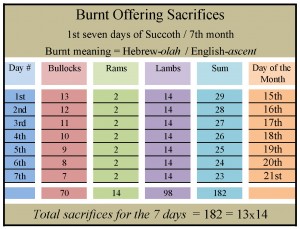 But the symbolism doesn’t stop there. Numbers 28 and 29 go on to prescribe 13 sacrifices each day for the entire Feast of Unleavened Bread, as well as during Shavuot, Yom Kippur, and the 8th day of Tabernacles. As we will see in the next chapter, the sacrificial instructions for the first seven days of the Feast of Tabernacles (Sukkoth) are nothing short of amazing!
But the symbolism doesn’t stop there. Numbers 28 and 29 go on to prescribe 13 sacrifices each day for the entire Feast of Unleavened Bread, as well as during Shavuot, Yom Kippur, and the 8th day of Tabernacles. As we will see in the next chapter, the sacrificial instructions for the first seven days of the Feast of Tabernacles (Sukkoth) are nothing short of amazing!
But before we get to that, there is a hidden treasure yet to be discovered in the Feast of Unleavened Bread. Unleavened Bread is a feast of seven days which began with the Passover supper. In order to see the wonderful symbolism here, a little history of Israel’s exodus from Egypt is required.
(Authors Note: The Feast of Trumpets, according to Numbers 29, also requires 13 sacrifices, but if the new-moon sacrifices of the first month are included, they make for 24. Leviticus 23 includes two peace offerings for the feast of Shavuot that are not included in the sacrifices of Numbers 28. This would make for 15 if both instructions were combined. It is also important to note that any day that fell on a Sabbath required two additional sacrifices.)
The Passover and the Exodus
Few Old Testament stories capture our imaginations like the exodus of Israel from Egypt. From Moses’s confrontation with Pharaoh to the plagues, the angel of death, and finally the crossing of the Red Sea, the imagery is captivating, sobering, and finally triumphant. The events described in the book of Exodus set a pattern or shadow, if you will, which the New Testament sees fulfilled in the death and resurrection of Yeshua.
Most of us know the story of the Passover. Every Israelite household was instructed to kill a lamb and mark the doorposts with its blood. This sacrifice is described in the Bible as “YHWH’s Passover.” The angel of death would “pass over” any house upon which this blood was found, thus sparing the inhabitants the death of their firstborn in Egypt’s most terrible plague.
The order and timing of these events are fascinating, not least because they mark the Passover with the symbolism of the Messiah factors which I’ve described in my book The 13th Enumeration: Key to the Bible Messianic Symbolism. Let’s take a look:
And they departed from Rameses in the first month, on the fifteenth day of the first month; on the morrow after the passover the children of Israel went out with an high hand in the sight of all the Egyptians. For the Egyptians buried all their firstborn, which YHWH had smitten among them: upon their gods also YHWH executed judgments. (Numbers 33:3 4)
The above passage gives us an excellent fixing point in the chronology of the exodus. Verse 3 makes it clear that the exodus from Egypt began on the 15th day of the first month. Further, it informs us that this same day, the Egyptians were busy burying their firstborn dead. Exodus 12 fixes the chronology even further with the instructions concerning the Passover lamb. They were to keep this lamb until the 14th day, kill it in the evening (sundown) of the 14th day, and then eat it that night, which began the 15th of Nisan—the same night the angel of death passed over Egypt.
Your lamb shall be without blemish, a male of the first year . . . And ye shall keep it up until the fourteenth day of the same month: and the whole assembly of the congregation of Israel shall kill it in the evening. And they shall take of the blood, and strike it on the two side posts and on the upper door post of the houses, wherein they shall eat it. And they shall eat the flesh in that night, roast with fire, and unleavened bread; and with bitter herbs they shall eat it. Eat not of it raw, nor sodden at all with water, but roast with fire; his head with his legs, and with the purtenance thereof . . . And ye shall let nothing of it remain until the morning; and that which remaineth of it until the morning ye shall burn with fire.
And thus shall ye eat it; with your loins girded, your shoes on your feet, and your staff in your hand; and ye shall eat it in haste: it is YHWH’S passover. For I will pass through the land of Egypt this night, and will smite all the firstborn in the land of Egypt, both man and beast; and against all the gods of Egypt I will execute judgment: I am YHWH. (Exodus 12:5–12)
And it came to pass, that at midnight YHWH smote all the firstborn in the land of Egypt . . . And Pharaoh rose up in the night, he, and all his servants, and all the Egyptians; and there was a great cry in Egypt; for there was not a house where there was not one dead. And he called for Moses and Aaron by night, and said, Rise up, and get you forth from among my people . . . And the Egyptians were urgent upon the people, that they might send them out of the land in haste; for they said, We be all dead men. (Exodus 12:29–33)
Based upon the above chronology, the Passover lambs were killed on the 14th of Nisan just before or right at sundown, which began the 15th day of the month. This passage makes it clear that the sacrifice was not eaten until that “night,” the very same night the angel of death “passed over” the land of Egypt. Remember, a new biblical day begins at sundown.
And God called the light Day, and the darkness he called Night. And the evening and the morning were the first day. (Genesis 1:5)
Now consider once again the instructions of Numbers 28 in light of this chronology. Numbers 28 requires 13 sacrifices to be made on the 15th of Nisan, the first day of the Feast of Unleavened Bread. But there is a 14th sacrifice as well. The Passover lamb, killed on the 14th, was to be eaten “in that night,” which began the 15th of Nisan. So in fitting symbolism, just as Matthew 1 shows Yeshua as both the 13th and 14th Enumerations, the first day of the Feast of Unleavened Bread, the very biblical holyday which represents Yeshua’s atonement on our behalf, requires 13 sacrifices to be made, but in fact 14 are consumed! This brings new meaning to the words of Paul in his epistle to the Corinthians:
Purge out therefore the old leaven, that ye may be a new lump, as ye are unleavened. For even Christ our passover is sacrificed for us. (1 Corinthians 5:7)
Messianic symbolism indeed!
Chronology and Context
As I’ve explored at this blog and in my books Daniel’s 70 Weeks: The Keystone of Bible Prophecy and The Jubilee Code: Prophetic Milestones in Yahweh’s Redemptive Plan, it was because of the faith Abraham displayed there on mount Jehovahjireh that YHWH swore (Shaba) with Him the first oath sworn with any man in the Bible. That oath promised, in part, that through Isaac and his “seed” all nations of the earth would be blessed.
40 Juiblee’s after that promise was given to Abraham it was fulfilled in Yeshua. Did you know that today you are living in the anniversary of the fulfillment of that great promise? It has now been 40 Jubilee since Yeshua’s death and resurrection. Another 40 jubilee cycles have run their course and many signs are pointing to the closing of that period the Bible describes as the times of the Gentiles. Are you ready for Yeshua to return again?
As you celebrate this Passover season I hope that you’ll think about the Bible’s sacrificial symbolism which Yeshua fulfilled 40 Juiblee’s ago. We are living in an equally prophetic period of time and I believe now is the time to look up for your salvation, your Yeshua draws near.
And when these things begin to come to pass, then look up, and lift up your heads; for your redemption draweth nigh. (Luke 21:28 28)
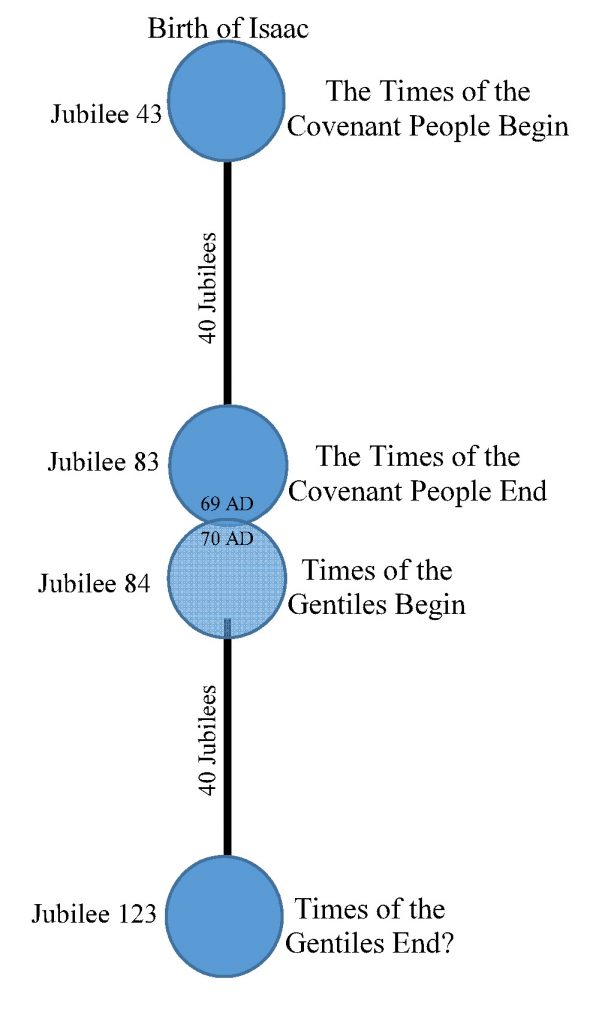
“And thou shalt say unto them, This is the offering made by fire which ye shall offer unto YHWH; two lambs of the first year without spot day by day, for a continual burnt offering.”
—Numbers 28:3–4
“And in the fourteenth day of the first month is the passover of YHWH. And in the fifteenth day of this month is the feast: seven days shall unleavened bread be eaten . . . But ye shall offer a sacrifice made by fire for a burnt offering unto YHWH; two young bullocks, and one ram, and seven lambs of the first year . . . and one goat for a sin offering, to make an atonement for you. Ye shall offer these beside the burnt offering in the morning, which is for a continual burnt offering. After this manner ye shall offer daily, throughout the seven days, the meat of the sacrifice made by fire, of a sweet savour unto YHWH: it shall be offered beside the continual burnt offering, and his drink offering.”
—Numbers 28:16–24
“Also in the day of the firstfruits . . . But ye shall offer the burnt offering for a sweet savour unto YHWH; two young bullocks, one ram, seven lambs of the first year . . . and one kid of the goats, to make an atonement for you. Ye shall offer them beside the continual burnt offering, and his meat offering, (they shall be unto you without blemish) and their drink offerings.”
—Numbers 28:26–31

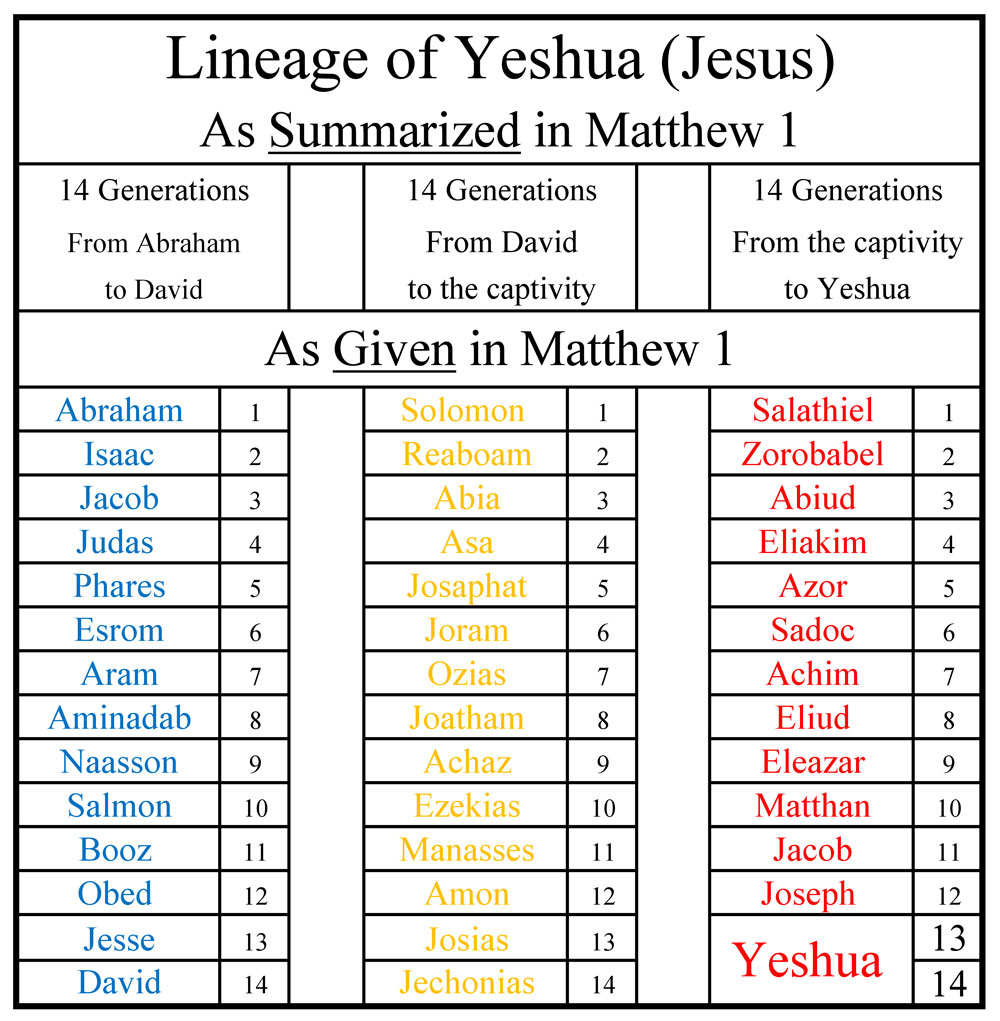
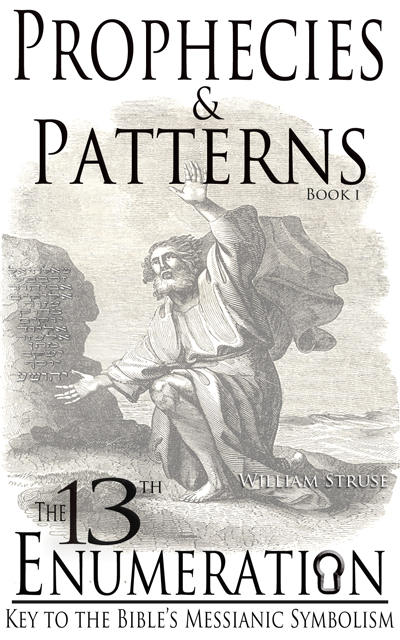
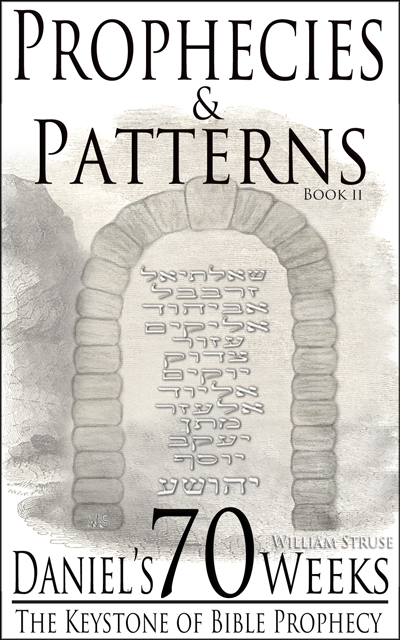
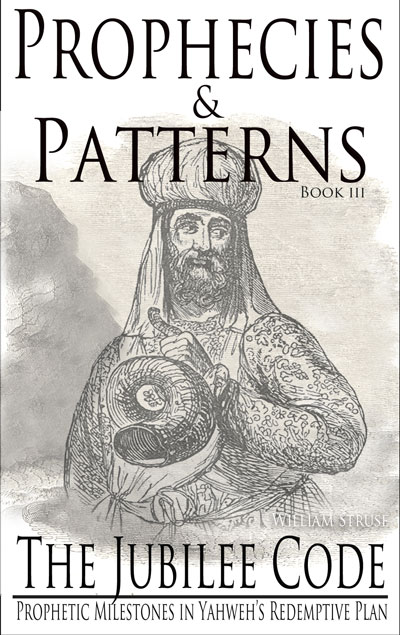
2 bullocks (burnt offering)
1 ram (burnt offering)
7 lambs (burnt offering)
1 kid of the goats (sin offering)
2 lambs (continual burnt offering)
13 total sacrifices
I have read Numbers 28:11-15, but have been unable to discover where the additional 2 lambs are mentioned. Please clarify.
Thank you.
revcbross@gmail.com
Good afternoon Brian,
Numbers 28:1-10 provides the clarification.
Warm regards,
William
Numbers 28:1-8 And YHWH spake unto Moses, saying, 2 Command the children of Israel, and say unto them, My offering, and my bread for my sacrifices made by fire, for a sweet savour unto me, shall ye observe to offer unto me in their due season. 3 And thou shalt say unto them,
This is the offering made by fire which ye shall offer unto YHWH; two lambs of the first year without spot day by day, for a continual burnt offering.
4 The one lamb shalt thou offer in the morning, and the other lamb shalt thou offer at even; 5 And a tenth part of an ephah of flour for a meat offering, mingled with the fourth part of an hin of beaten oil. 6 It is a continual burnt offering, which was ordained in mount Sinai for a sweet savour, a sacrifice made by fire unto YHWH. 7 And the drink offering thereof shall be the fourth part of an hin for the one lamb: in the holy place shalt thou cause the strong wine to be poured unto YHWH for a drink offering. 8 And the other lamb shalt thou offer at even: as the meat offering of the morning, and as the drink offering thereof, thou shalt offer it, a sacrifice made by fire, of a sweet savour unto YHWH.
Thank you. At my age, I should have automatically read the full context!!
To understand the Passover timing, we have to understand the way God created the ‘day.’ E.g “And evening and morning were the first day.” Gen 1: 5 end of verse. (This, incidentally was the most difficult aspect to ‘get my head around’ when researching/writing the Apostle John Series, especially as the Roman calendar was in effect then too.)
Back to the Passover. Kill the Passover lambs between the two evenings ‘ben ha arbayim’ – basically twilight – as the 13th was ending and the 14th beginning. The day portion of the 14th – after sunrise was preparation and making their way to Ramses where they gathered, organized themselves and as the 14th was ending and the 15th beginning went out at night.
I had to thoroughly understand this way of counting days for my book series because the 1st Christians kept to the Sabbaths and Holy Days. Why the Romans decided to start the day at 00.01 I have no idea and have only found reference to several calendars by various Roman emperors. All of which needed a lot of revision.
God’s way is evening and morning. Why? Guess we will find out one day LOL.
Good evening Susan,
Always good to hear from you. How are your books coming?
Here is how I understand the chronology.
Warm regards,
William
And thus shall ye eat it; with your loins girded, your shoes on your feet, and your staff in your hand; and ye shall eat it in haste: it is YHWH’s Passover. For I will pass through the land of Egypt this night. Exo.12:11
“And it came to pass, that at midnight YHWH smote all the firstborn in the land of Egypt,…” Exo. 12:29
And this day shall be unto you for a memorial; and ye shall keep it a feast to YHWH…. Seven days shall ye eat unleavened bread; ….And in the first day there shall be an holy convocation, and in the seventh day there shall be an holy convocation to you; …And ye shall observe the feast of unleavened bread; for in this selfsame day have I brought your armies out of the land of Egypt. Exo. 12
In summary, the above chronology clearly shows that Israel killed their Passover lambs on the 14th day at “even” just before sundown which began the 15th. The night beginning the 15th of Nisan they ate the Passover, leaving nothing of it until the morning, as they were commanded. When the morning of the 15th came, Israel, fully dressed, shod, and with much treasure from their Egyptian neighbors, departed Rameses.
And they departed from Rameses in the first month, on the 15 day of the first month; on the morrow after the passover the children of Israel went out with an high hand in the sight of all the Egyptians. Numbers 33:3-8
* * *
Hi Bill, my books are doing okay, thank you. The series has finished – five books. Three have Finalist awards in International competitions, and they have just had a cover upgrade.
Passover timing…
As the 14th started it was evening. Jesus kept it at the time of the domestic Passover, which was still a common occurrence then. The temple sacrifice did not happen until the afternoon of the 14th (next day to us.)
I did a huge amount of study on this.
Ben ha arbayim basically means twilight. That’s when they were to kill the lambs.
Judaism joined Passover to the Days of Unleavened Bread. And especially in the gospel of John, this is why there is reference to the Passover of the Jews. Jesus kept a domestic Passover as originally instructed before changing the symbols. He ended the Old Covenant and instituted the New Covenant.
The evening of the 14th when Jesus did this was at the start of the 14th. The Roman calendar messes with the thinking on this. LOL.
Warm regards
Susan
Hi Susan,
I’m not familiar with the “domestic” Passover. What is the idea based upon?
Regarding the start of the Passover at “even” I just don’t see any justification in the Exodus story for it being at the start of the 14th. This doesn’t make sense with the chronological flow of events described. The only place in the Bible that I’m aware of that clearly delineates the day as it relates to “even” is found in Lev. 23
AS can be seen from this passage when, “when” even is mentioned in regards to a day it refers to the end of the day. The 9th day at even is clearly a reference too the start of the Day of Atonement on the 10th day of the 7th month. For us to then claim that the “even” of the 14th when the lambs were killed is actually the start of the 14th day clearly contradicts the spirit of Lev. 23. Do you know of any clear Biblical reference that describes “even” as referring to the start of the day in question as apposed to the end of the day as exemplified by Lev. 23?
Always love looking into these subject and always good to hear from you.
Warm regards,
Bill
Hello, again! I apologise for ‘butting in’ on someone else’s discussion. Hoowever, surely Genesis 1 is sufficient Biblical warrant for taking “even” as the beginning of the Hebrew/Jewish day: “And there was evening and there was morning, one day.” (v.5, inter al). Even your own quotation from Leviticus 23 would indicate this: “It shall be unto you a sabbath of rest, and ye shall afflict your souls: in the ninth day of the month at even, from even unto even, shall ye celebrate your sabbath” (v.32). “… from even unto even, …” surely suggests from beginning to end!
I claim no deep expertise in these matters, but have taught, for many years, that the Jewish day is from sunset to sunset – or “even unto even”.
Blessings, and shalom.
Brian
Hi Brian,
I agree with you that the Biblical calendar day begins at “even”. I probably didn’t articulate my point well enough but the challenge is what calendar day does “even” refer to. In other words when the Bible says the Passover is to be kept on the 14th day at even, is this a reference to the beginning of the 14th day or the beginning of the 15th day? Based upon the criteria of Leviticus 23, the 14th at “even” reference the beginning of the 15th not the beginning of the 14th. Hope that clarifies my understanding.
BTW, don’t mind at all you adding your thoughts. Thats what this is all about.
Warm regards,
William
Many thanks – for both the response, and the ‘permission’!!
In Him
B
Hi find your work very interesting love reading it. I have been doing a study on the Passover and know that the Jews have not celebrated Passover since 70ad due to no temple so they keep the feast of unleavened bread from the 15th. But I too believe that the Passover lamb wa sacrificed on the evening starting the 14th. As the 15th is always a Sabbath so Yeshua could not have been crucified on 15th. Also if you look at the 3 days and 3 nights and also at Bible numerology 14 = Deliverance 15 = new direction 16 = love 17= victory. That year both the 15 and 16 were Sabbaths and Yeshua rose on 17 3 days and 3 nights. It seems impossible for Yeshua to die on 15th Lev 23 ‘ a holy convocation’
Been ill, again, so only just seen this interesting discussion. I am currently writing a blog post about the day beginning after sunset, which is in the evening. It was the most difficult thing for me to ‘get my mind around’ when writing the Apostle John Series. The start of the day would have been night time for us. Brian is correct, Genesis 1 gives God’s timing for the day.
We are so used to the Roman calendar we treat the ‘middle of the night’ so to speak as the beginning of the day.
As for ‘domestic Passover’ – that’s what God commanded. It was never a temple sacrifice until Hezekiah’s time when, in an effort to rid the country of pagan sacrifices he made the Passover a temple sacrifice after cleaning it up. I believe that Josiah did a similar thing. Ezra also made changes – all of them for the same reason, to get rid of pagan influences.
At the time of Jesus, many people kept the domestic Passover, and some the temple one. Jesus kept the domestic one, then changed the symbols.
Josephus gives a count of the lambs sacrificed at Passover and scholars agree they could not have all been sacrificed at the temple even with the three courses of priests working.
The domestic sacrifice made it personal. The lamb was sacrificed for the sins of the people who ate of it. Modern time, our sins are what Christ died for as our Passover Lamb.
Blessings
Susan